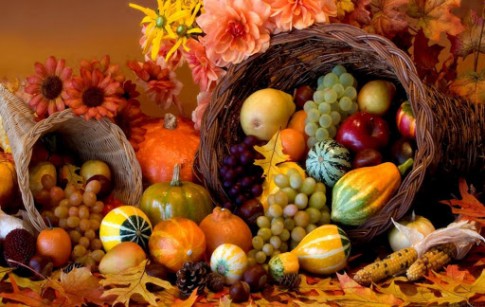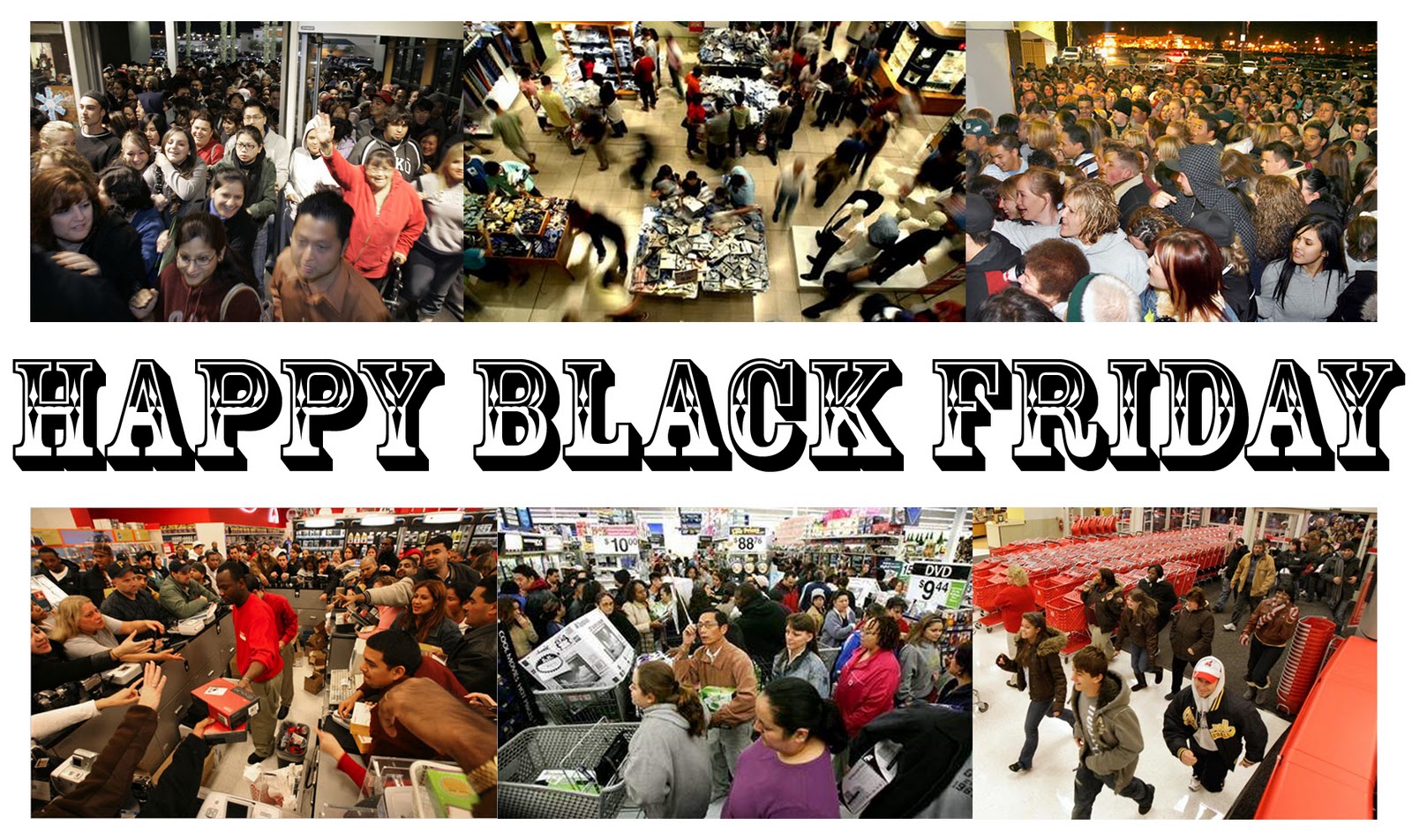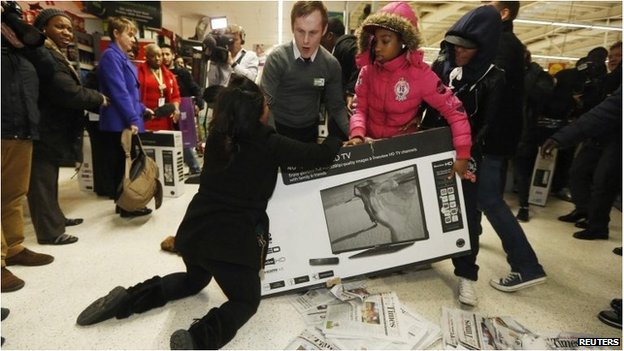Thanksgiving Day: A time to Give Thanks and Reflect

Photo: staztic.com
Giving Thanks: But for What?
For This?

Photo: beforeitsnews.com
The words of the 20th-century Hindu sage J. Krishnamurti come to mind: "It is no measure of health to be well-adjusted to a profoundly sick society." This kind of pursuit of happiness is near exhaustion for a lot of Americans. Judging from the epidemic of depression and anxiety that defines the current era, our materialism may be near collapse, propped up only by the thousands of psychiatrists busy medicating younger and younger people who are bottoming out in the cathedrals of consumerism.
‘The Roman philosopher Marcus Aurelius wrote, "Remember that very little is needed to make a happy life." In consumer cultures, it's still simple to be happy but difficult to be simple! Thankfulness frees us from the things that we do not need or even really want, but that we thought we wanted because we were comparing ourselves with others.’
Breaking News!!
“Walmart To Kick Off Black Friday Sales At 6 P.M. On Thanksgiving
Walmart is joining other retailers in turning Black Friday from a one-day shopping bonanza to a multiday event, the company announced Wednesday.
The big-box chain will kick off its deal spree just after midnight on Thanksgiving at Walmart.com and will offer doorbuster events at 6 p.m. and 8 p.m. at all locations on Thanksgiving itself. Then beginning at 6 a.m. on Black Friday -- the day traditionally reserved for post-Thanksgiving shopping -- the retailer will offer more discounts on everything from iPhones to Fisher-Price toys.
This year, the retailer plans to attract shoppers with deals on things like iPad minis and 65-inch TVs for those customers who are in designated areas of the store between 6 and 7 p.m. on Thanksgiving. Starting at 8 p.m., Walmart will be offering deals on other electronics, like Beats by Dre headphones and Fitbit exercise trackers.
Walmart's competitors will also be kicking off Black Friday events at similar times. Target and Macy’s are both opening at 6 p.m. on Thanksgiving Day.”
Thanksgiving vs. Black Friday: Giving Thanks or 'Feeding Frenzy'*
“Thanksgiving is an asset that has to be cultivated. Black Friday is its nemesis. The malls fill at midnight -- and many hours earlier -- with consumer stampedes and sporadic violence. The spirit of Thanksgiving is lost in the dust. Too bad, because gratitude is a wonderfully beneficial.
As distinguished University of California-Davis professor Robert Emmons has shown, pausing once a day for a few minutes to focus on the things we are grateful for increases positive mood by 20 percent. His research team has also demonstrated that gratitude journaling once a week over six weeks lowers depression levels in adolescents. Writing a thank you note creates calmness. Inviting everyone at the dinner table to mention the things they are most grateful improves positive communication. Grateful individuals tend to take more time for acts of kindness, and this in turn gives them hope. And as any etiquette maven will attest, a thankful individual tends to be well received in schools, communities, and workplaces, creating opportunities. What's not to like?
So we should be mindful about Thanksgiving and reaping the benefits, rather than focusing on the "feeding" frenzy of midnight "malling" (or perhaps, "mauling"). We should be thankful for the universe, for the arching sky and constellations on high; for lakes and rivers; for one another; for beauty in nature; for the talents we are given; for the hopes by which we are led; for the comforts and joys of homes and families and friends; for kids playing in fall leaves; and maybe for the season's first snow fall.
But Black Friday represses the spirit of Thanksgiving, crowding it out of mind and out of sight. It focuses the mind on that $200 pair of designer jeans that may provide a brief hedonic euphoria, but it fades so quickly. The more lasting forms of happiness are demonstrated by prominent psychologist and author Martin E.P. Seligman to come from immersion ("flow") in constructive activities and, as I have emphasized in my own long-term research into the power of altruism, from sticking with benevolent values that provide meaning over the course of a lifetime.
To be sure, at Black Friday's midnight madness, there will be the crowd-inspired clenched fists and the crushed bodies. Violence and callousness will break out. It will all add to the headlines in a world of drive by shootings and degradation.
Black Friday started with just a few retailers trying to get ahead of the competition. Now they all follow suit. They advertise on radio and TV, running roughshod over the one day in the year when we are setting aside time to give thanks -- and perhaps to provide meals for the less fortunate in our communities. Maybe retailers should put Black Friday back in the box next year, and for years to come.
The words of the 20th-century Hindu sage J. Krishnamurti come to mind: "It is no measure of health to be well-adjusted to a profoundly sick society." This kind of pursuit of happiness is near exhaustion for a lot of Americans. Judging from the epidemic of depression and anxiety that defines the current era, our materialism may be near collapse, propped up only by the thousands of psychiatrists busy medicating younger and younger people who are bottoming out in the cathedrals of consumerism.
The Roman philosopher Marcus Aurelius wrote, "Remember that very little is needed to make a happy life." In consumer cultures, it's still simple to be happy but difficult to be simple! Thankfulness frees us from the things that we do not need or even really want, but that we thought we wanted because we were comparing ourselves with others.
So let's give Thanksgiving a chance. Let's make a point of dwelling on whatever we are most grateful for as we go to school or to work, or before we take that first bite of a meal. Thanksgiving is an idea and a practice with high dividends for those who might be fortunate enough to own it long-term investments of the soul. It is a universal "law of life" that will stand the test of time. It confers a happiness worth having -- and no one gets trampled.”*
*The above article by Stephen G. Post was first originally published on HUFF POST Healthy Living on 27 November 2013:
Thanksgiving vs. Black Friday: Giving Thanks or 'Feeding Frenzy' | Stephen G. Post
“But there is something about Black Friday -- in the pandemonium of its execution -- that is unsettling and cynical. The Wal-Mart employee who was trampled to death on Long Island in 2008 as shoppers knocked the doors from their hinges and stepped on him in their rush to the stacks of sales items, the woman in California last year who unleashed pepper spray on fellow shoppers vying for Xbox video game consoles. . .those kinds of scenes are becoming the iconic images of the long night.
Of course, the new holiday would not have taken hold if people weren't embracing it.
But you have to ask yourself: When people, as they grow older, remember the best holidays of their lives, is it some discounted gift that they recall with warmth and fondness? Some deal that they found? Or is it the family members and loved ones with whom they spent the holiday time?
Breaking up the flow of a real holiday so you can make it on time to the beginning of the Black Friday holiday seems a little misguided. It is one thing during the holiday season to be touched by the poignancy of long lines at soup kitchens and food pantries; it is quite another to witness throngs in the darkness bearing credit cards, waiting to stampede through stores in desperate and hungry-eyed pursuit of flat-screen TVs and Blu-Ray players.
At least earnest groups of neighborhood vocalists are not -- yet -- going door-to-door singing Black Friday carols.
But just give them time.”+
+ Is Black Friday edging out Thanksgiving? - CNN.com
And now finally:
Before posting this article online, I sent it to my friend and colleague, Prof. Steve Szeghi, Wilmington College, Ohio, and the Co-editor, GCGI Journal for his comments and advice.
I was then pleased to get his reply: "I just wanted you to know that I thought the article you wrote about Thanksgiving verses Black Friday is absolutely fantastic."
However, he then had added the following to his comments:
"In the United States today, Thanksgiving Day has become a focal point of protest for indigenous peoples, in order to highlight the historical and continuing injustices done to native peoples."
Steve suggested the following well regarded scholarly sources for further reading.
“Bury My Heart at Wounded Need: An Indian History of the American West”, by Dee Brown, see the early chapters, 1970, Holt, Rinehart, and Winston publishers, New York
“A People’s History of the United States”, by Howard Zinn, Chapter 1, ‘Columbus, The Indians, and Human Progress’, 1980, HarperCollins Publishers, New York
Steve then suggested that I might also consider sharing the article “The Real Story of Thanksgiving” by Susan Bates with the readers of this Blog. It is an example of one indigenous perspective. Please read it below:
THE REAL STORY OF THANKSGIVING
by Susan Bates
“Most of us associate the holiday with happy Pilgrims and Indians sitting down to a big feast. And that did happen - once.
The story began in 1614 when a band of English explorers sailed home to England with a ship full of Patuxet Indians bound for slavery. They left behind smallpox which virtually wiped out those who had escaped. By the time the Pilgrims arrived in Massachusetts Bay they found only one living Patuxet Indian, a man named Squanto who had survived slavery in England and knew their language. He taught them to grow corn and to fish, and negotiated a peace treaty between the Pilgrims and the Wampanoag Nation. At the end of their first year, the Pilgrims held a great feast honoring Squanto and the Wampanoags.
But as word spread in England about the paradise to be found in the new world, religious zealots called Puritans began arriving by the boat load. Finding no fences around the land, they considered it to be in the public domain. Joined by other British settlers, they seized land, capturing strong young Natives for slaves and killing the rest. But the Pequot Nation had not agreed to the peace treaty Squanto had negotiated and they fought back. The Pequot War was one of the bloodiest Indian wars ever fought.
In 1637 near present day Groton, Connecticut, over 700 men, women and children of the Pequot Tribe had gathered for their annual Green Corn Festival which is our Thanksgiving celebration. In the predawn hours the sleeping Indians were surrounded by English and Dutch mercenaries who ordered them to come outside. Those who came out were shot or clubbed to death while the terrified women and children who huddled inside the longhouse were burned alive. The next day the governor of the Massachusetts Bay Colony declared "A Day Of Thanksgiving" because 700 unarmed men, women and children had been murdered.
Cheered by their "victory", the brave colonists and their Indian allies attacked village after village. Women and children over 14 were sold into slavery while the rest were murdered. Boats loaded with a many as 500 slaves regularly left the ports of New England. Bounties were paid for Indian scalps to encourage as many deaths as possible.
Following an especially successful raid against the Pequot in what is now Stamford, Connecticut, the churches announced a second day of "thanksgiving" to celebrate victory over the heathen savages. During the feasting, the hacked off heads of Natives were kicked through the streets like soccer balls. Even the friendly Wampanoag did not escape the madness. Their chief was beheaded, and his head impaled on a pole in Plymouth, Massachusetts -- where it remained on display for 24 years.
The killings became more and more frenzied, with days of thanksgiving feasts being held after each successful massacre. George Washington finally suggested that only one day of Thanksgiving per year be set aside instead of celebrating each and every massacre. Later Abraham Lincoln decreed Thanksgiving Day to be a legal national holiday during the Civil War -- on the same day he ordered troops to march against the starving Sioux in Minnesota.
This story doesn't have quite the same fuzzy feelings associated with it as the one where the Indians and Pilgrims are all sitting down together at the big feast. But we need to learn our true history so it won't ever be repeated. Next Thanksgiving, when you gather with your loved ones to Thank God for all your blessings, think about those people who only wanted to live their lives and raise their families. They, also took time out to say "thank you" to Creator for all their blessings.”
The above article by Susan Bates was first published on the website of Manataka American Indian Council:
THE REAL STORY OF THANKSGIVING
Be Inspired: The Wisdom Corner
The links noted below are amongst my Blog postings which are there to provide ideas for inspirational stories for everyone, encouraging contemplation, soul searching and spiritual enrichment.
Whenever you get a chance, please take a few minutes to watch, listen and read some of the amazing narratives below: They are some examples of the many gems I have discovered in my life journey from the wisdom of others. They have opened new horizons in my life. For that I cannot be grateful enough.
Here, by sharing their wisdom with you, I hope they will do the same for you.
Transforming Lives for the Common Good: From Consumerism to Sustainability
What might an Economy for the Common Good look like?
Wisdom of Lao Tzu: The Path to Virtue, Happiness, and Harmony
The Meaning of Life: tuesdays with Morrie
The Good Life: Lessons from Benjamin Franklin
Adam Smith and the Pursuit of Happiness
Ten Virtues to Lead a Good Life
Build a Better World: The Healing Power of Doing Good
The Story of a Businessman for the Common Good
Sam Berns: ‘My Philosophy For A Happy Life’
In Search of Meaning in Life: Happiness Revealed
The Value of Values: Why Values Matter
The GCGI: How It Began
A Look at Thanksgiving-Black Friday in Britain
Black Friday consumer frenzy is bad for the environment
A day once synonymous with fighting for social justice has been rebranded to being associated with fighting for large, flat panel TVs and energy hungry gadgets

“…Whoever named Black Friday failed history at school or was being bitterly ironic, as the precedents are bleak. You can pick between the chronic ‘Black Friday’ stock market crash of 1869, driven by gold speculators, or the brutal ‘Black Friday’ assaults by police on Suffragettes in 1910.
A day once synonymous with fighting for social justice has been rebranded to being associated with fighting for large, flat panel TVs.
If that isn’t sobering enough, the health warning about what happens to your life satisfaction after being dipped in the values of materialism should be. In numerous studies across different demographics people who are more oriented towards materialistic values have been found to be less likely to be satisfied with life, experience fewer ‘pleasant emotions,’ more distress, anxiety and depression, are more prone to narcissism and substance abuse, and are more likely to experience negative emotions like being ‘angry, scared and sad.’
They also demonstrate higher levels of aggression, stealing, cheating, being unethical in business, having lower empathy, manipulative behaviour, prejudice and a tendency towards authoritarianism. To cap it all when the values of materialism get the upper hand you are less likely to recycle and conserve energy, and your overall lifestyle is more likely to include choices that are worse for the environment…
The great critic and thinker John Ruskin had a bad press recently in the film of the painter Turner’s life. But he understood the hollow promise of high finance and materialism, famously relating in his great book, Unto This Last, how that, “In a wreck of a Californian ship, one of the passengers fastened a belt about him with two hundred pounds of gold in it, with which he was found afterwards at the bottom. Now, as he was sinking – had he the gold? Or had the gold him?”
And it was from Ruskin that Gandhi, the white collar lawyer, learned that the life of craft, of understanding and working with materials, as opposed to jaded materialism, “is the life worth living.” A few such simple principles could guide a richer, new kind of materialism that respects and enjoys the world we live in, rather than consuming it, leaving it forgotten in storage, or ditched in a landfill site.”
Read more:
Black Friday consumer frenzy is bad for the environment | Environment | The Guardian
